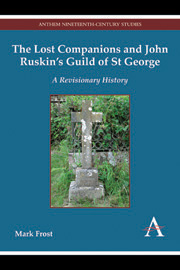Book contents
- Frontmatter
- Dedication
- Contents
- List of Illustrations
- Preface
- Frequently Cited Sources
- Introduction
- Chapter One Roots
- Chapter Two Glimpsing Eden: 1867–70
- Chapter Three ‘At Least a Beginning’: 1871–75
- Chapter Four Opportunities: 1875–77
- Chapter Five Dreams and Nightmares: 1878–81
- Chapter Six The Long Decline and the Great Dispute: 1882–1900
- Afterword
- Appendix Companions of the Guild of St George: Early Lists
- Notes
- Bibliography
- Index
- Frontmatter
- Dedication
- Contents
- List of Illustrations
- Preface
- Frequently Cited Sources
- Introduction
- Chapter One Roots
- Chapter Two Glimpsing Eden: 1867–70
- Chapter Three ‘At Least a Beginning’: 1871–75
- Chapter Four Opportunities: 1875–77
- Chapter Five Dreams and Nightmares: 1878–81
- Chapter Six The Long Decline and the Great Dispute: 1882–1900
- Afterword
- Appendix Companions of the Guild of St George: Early Lists
- Notes
- Bibliography
- Index
Summary
Although influence is amongst the slipperiest of critical concepts, the Guild came from somewhere, and so its roots must be traced. The aim here is to examine the interplay of some prominent influences at work in the production of Ruskin's Guild idea and to suggest that its roots were diverse, wide-ranging, and complex. I will also suggest that the Guild was merely one manifestation of a fundamental conflict in Ruskin's world-view, a conflict that resulted from attempts to synthesise strands of his thinking that were deeply contradictory. The Guild exemplifies what I have elsewhere called the dual impulse of his epistemology, as he reached, on the one hand, towards a hierarchical organicism, and, on the other, towards a proto-ecological concept of interdependent mutualism. The tensions evident in this divided vision created an unresolved war at the heart of everything Ruskin attempted to do, a struggle played out far beyond natural history. The result, in terms of the Guild, was an idiosyncratic political vision, partly radical, partly reactionary, that could never effectively confront the problems of the age or produce a functional utopianism. Tracing how this vision formed is the principal task of a chapter that will try to be attentive to connections, interpenetrations, and tensions in the realm of influence.
I will consider the effects of the culture, religion, and politics of the Ruskin household; examine Ruskin's responses to formative literature, art, and travel; and analyse the manner in which his unhappy romance with Rose La Touche shaped the Guild's purposes and mythology. Biographical influences like this are important, but not sufficient. The immense impact of Ruskin’s religious upbringing must be carefully treated in relation to the influence of Romanticism, natural theology, and modern science, because their complex interaction was crucial in the formation of the central epistemological problem of Ruskin’s career. In extending this analysis, I want to turn to some key moments in Ruskin’s writing career – in particular his experiences of Venice and architecture; the formation of socially directed proto-ecological ideas in ‘The Law of Help’ and elsewhere; and the development of more directly political writings after 1860. Finally, I would like to examine some of the key contexts to which the Guild responded: educational policy and schools; poverty, charity, and Ruskin’s engagement with Octavia Hill’s housing work; and Victorian responses to environment.
- Type
- Chapter
- Information
- The Lost Companions and John Ruskin's Guild of St George , pp. 15 - 52Publisher: Anthem PressPrint publication year: 2014

